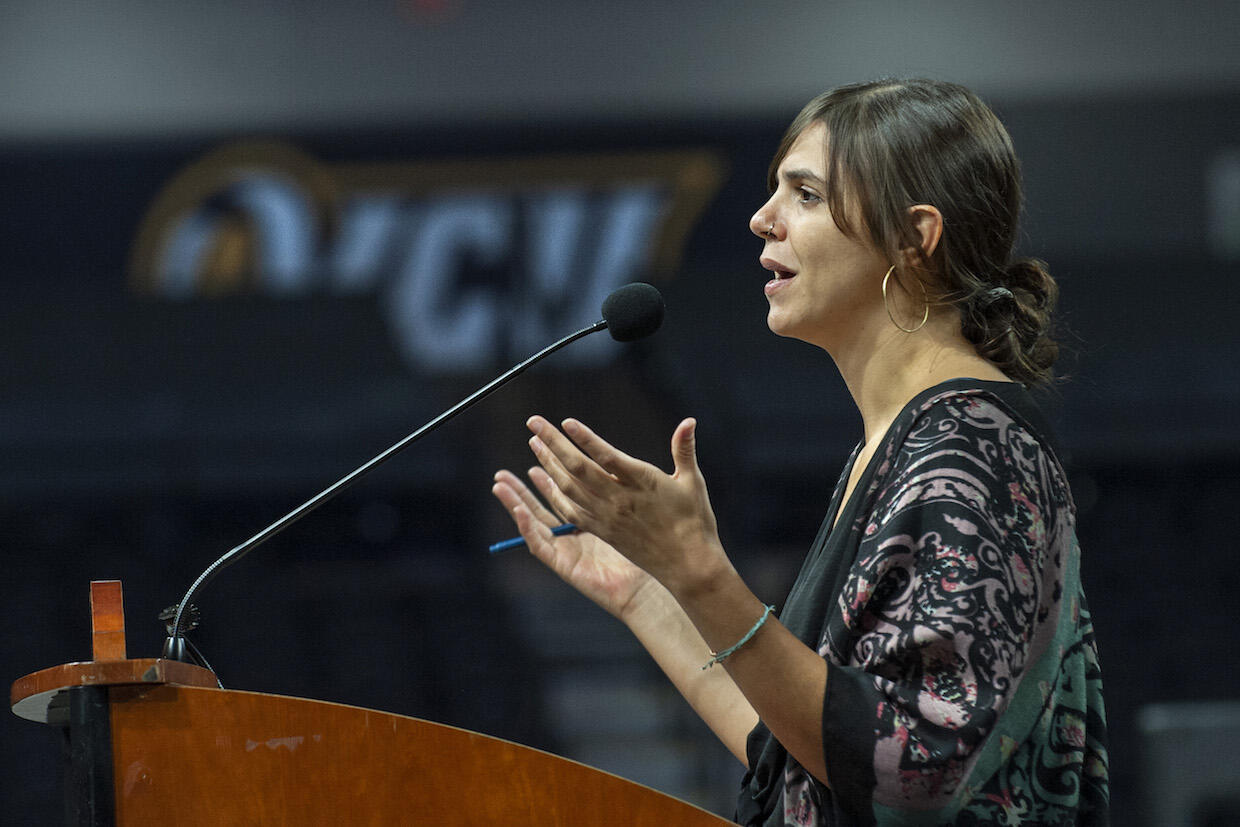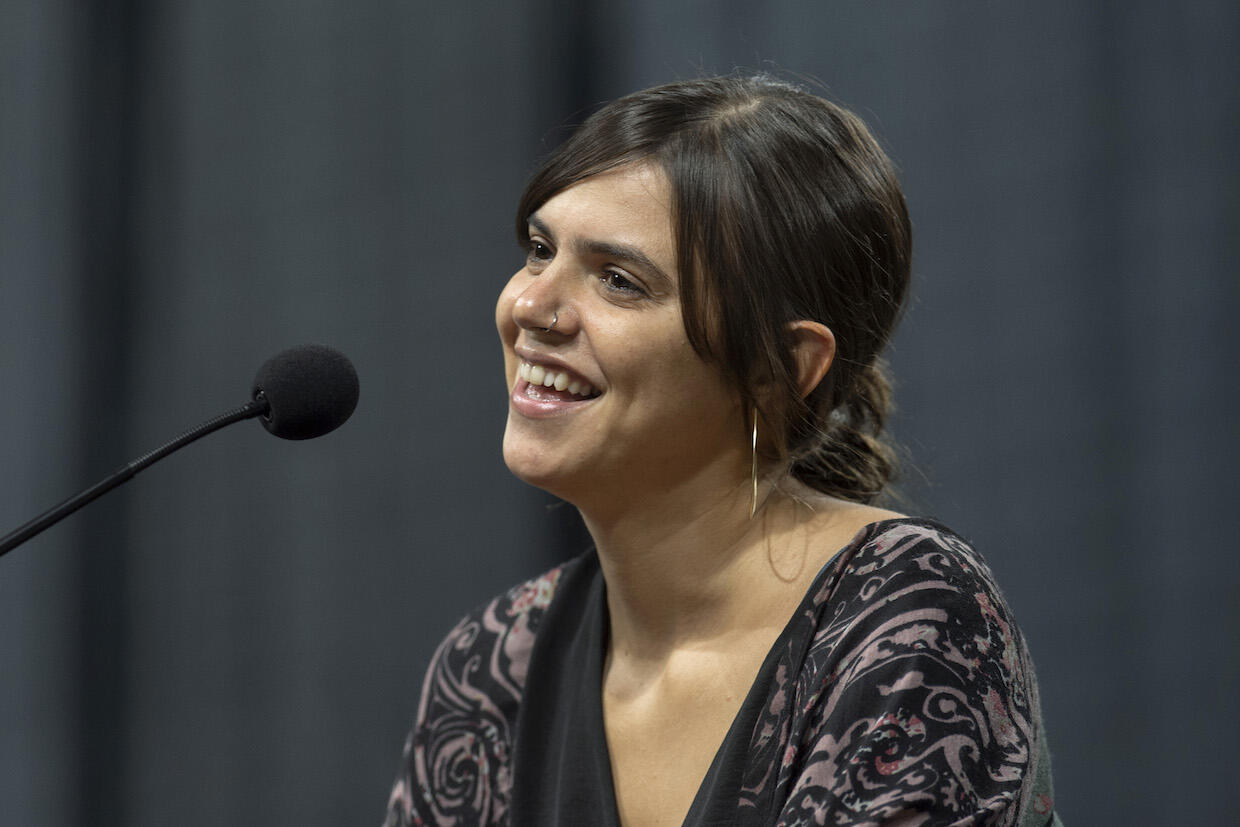
Nov. 15, 2018
Immigration is not a problem to be solved, it is simply reality, says VCU Common Book author
Share this story
Valeria Luiselli, Ph.D., author of “Tell Me How It Ends: An Essay in Forty Questions,” an exploration of the plight of undocumented children facing deportation from the United States, told a crowd of hundreds of Virginia Commonwealth University students on Wednesday that debate over the immigration crisis needs to shift from solving a problem to addressing reality.
“We have to start thinking about immigration in a different way, not as a problem to be solved in a messy, emergency kind of way, but as a reality that we are going to live with and grow up with,” said Luiselli, a novelist, essayist and volunteer interpreter for undocumented children in New York, whose 2017 book was this year’s VCU Common Book that is distributed to all first-year students and is also read by the wider VCU and Richmond communities.
Immigration, she said, is one of the most controversial subjects, particularly in today’s politically charged environment. Yet it is also marked by misconceptions and misunderstandings, starting with such basics as how many immigrants live in the United States.
“There are 13 percent immigrants in the U.S. A very, very low number,” she said. “The polls put it as high as maybe 17. So we could say anywhere between 13 and 17 percent. Yet we have the feeling, and more so in the past few years, we get the feeling through the media that we are being flooded somehow.”
Around the world, she said, immigration is simply the current reality and it will only continue.
“There are approximately 65 million people today who have had to flee their homes for different reasons — mostly political, but also related to climate change,” she said. “More and more we're going to be seeing climate refugees dispersed around the world.”
Reframing immigration
“Tell Me How It Ends” was selected as this year’s Common Book because it challenges readers to wrestle with the complexities of an immigration issue that has no simple solution, said Shelli Fowler, Ph.D., director of the Common Book program and associate dean and director of the bachelor of interdisciplinary studies for University College.
“In our current moment, with its increasingly polarizing rhetoric, both in the U.S. and elsewhere, rhetoric that attempts to deepen partisan divides, increase our fear of our Latinx neighbors, and feel generally disempowered to change the status quo, Luiselli's book prompts us to educate ourselves about the historical, political, cultural context of the current crisis. And she asks us to reframe the issue as one that has a hemispheric impact rather than remain only narrowly focused on national boundaries,” Fowler said.
A signature initiative of University College, the Common Book program aims each year to invite first-year students to begin to make connections across academic disciplines and to explore complex problem solving, to explore civic engagement and to consider the real-world application of knowledge.
“The program aims to model for our students the kind of deep engagement with difficult issues that is so necessary for 21st-century success, and it’s the kind of engagement that we hope will become the hallmark of their academic experience at VCU,” said Constance Relihan, Ph.D., dean of University College.
Luiselli's book prompts us to educate ourselves about the historical, political, cultural context of the current crisis. And she asks us to reframe the issue as one that has a hemispheric impact rather than remain only narrowly focused on national boundaries.
‘Being a priority was very bad news because it meant you'd just be deported faster’
Luiselli wrote “Tell Me How It Ends,” which is structured around the 40 questions on the intake questionnaire given to migrant children as they are taken into custody to help determine whether they will be given legal status, as a reaction to the immigration crisis in which a surge of 80,000 undocumented children came to the United States between October 2013 and June 2014.
In response, the Obama administration established a priority docket that expedited the asylum seekers’ court cases.
“In the case of immigration, and especially this kind of immigration, being a priority was very bad news because it meant you'd just be deported faster,” Luiselli said. “It also meant that when you previously had an entire year to look for a lawyer to defend you against deportation, now you only had 21 days.
“Try to imagine what it might be like for you to try to find a lawyer in 21 days if you had a problem right now,” she said. “And then try to imagine how that might be for a kid as young as 5 or 7 or 14 or 16 who is undocumented, who does not speak the language, and who feels generally disenfranchised.”
Nonprofit organizations joined together to help the children navigate the legal process. Luiselli signed up as a volunteer interpreter, helping provide both language and cultural translation services.
“Sometimes, for example, talking to kids, I would ask if they had to perform forced labor. They would say no. But when I inquired further, they might end up revealing that they were required to take a machete every morning during a period of time and go out into the fields and work for seven hours a day unpaid. Well, that is forced labor,” she said. “In certain contexts, that can be normalized. Whereas here, it would count as a component of neglect or abandonment or abuse that might lead to certain forms of immigration relief.”
Luiselli also had to help translate between a child’s world and the adult world.
“It's very difficult to explain to a 7-year-old questions such as, ‘Are there any mental illnesses in your family?’” she said.

‘It’s not eliminating the border; it’s the dismantling of a system’
If she were to write the book today, Luiselli said she would focus on the deep connections between immigration and mass incarceration, particularly involving the private prison industry.
“Immigration and detention has not yet been properly conceived as another part of that huge industrial-prison complex,” she said. “But the jails where the immigrants are incarcerated are owned and run by the same companies that own and run many of the private jails in the country. There’s one company in particular that has a pseudo-monopoly over immigration detention jails and jails. … It owns 65 percent of immigration detention spaces.”
Driving the industry, she said, is the fact that every incarcerated undocumented immigrant generates around $120 per day for the private prison companies. Undocumented children and teenagers, she said, generate almost double that amount.
“So it has become more and more lucrative to incarcerate children,” she said. “And what has happened in the last few years is that the rate of incarcerated undocumented minors has skyrocketed.”
If she could change one thing about the immigration system, it would be to dismantle the private prison industry, she said.
“If you think of, for example, the very prominent and very scary presence of [Immigration and Customs Enforcement] nowadays, and the way that ICE has been entitled and empowered to raid undocumented communities more and more, and the fact that they have received the largest ever federal budget that they have received, they wouldn't have the power and wouldn’t receive [such large amounts of federal] money if they weren't feeding bodies into prisons,” she said.
Prior to 9/11, she said, immigration was a matter for the Department of the Treasury and seen as an economic issue, not a national security threat.
“But as soon as we become suspicious of the other, as soon as the other is equated with some form of criminality, is viewed as ‘illegal’ and not simply undocumented, then it's very easy to justify a system in which people's rights are constantly breached,” she said.
Private prisons, she noted, do not exist in other democracies. Punishment is the responsibility of the government, not a private industry that profits from incarceration.
“If that system were dismantled, the criminalization of immigration would have less space,” she said. “We’ve seen an increasing criminalization of immigration, in part because there are a lot of interested actors in that criminalization. There are a lot of people who make a lot of money from it.”
The idea, she added, is realistic reform.
“It’s not eliminating the border,” she said. “It’s the dismantling of a system that doesn’t have much place in this country, that for some reason exists but need not exist.”
It has become more and more lucrative to incarcerate children. And what has happened in the last few years is that the rate of incarcerated undocumented minors has skyrocketed.
Ending the policy of jailing children
Luiselli encouraged the VCU students to continue to educate themselves about the realities of the immigration issue, and also to keep paying attention, particularly to the incarceration of children migrants and the separation of families.
“When people ask me what's going to happen to the caravan when they arrive here, I suspect that what's going to happen is that those 7,000, or 5,000, or however many people do arrive, are going to be immediately placed in spaces of incarceration,” she said. “That is where our attention has to be placed now. Things can happen if we don't know about them, and we remain in a state of voluntary ignorance if we don't look at things.”
Following Luiselli’s talk, she sat down with Gabriela León-Pérez, Ph.D., an assistant professor in the Department of Sociology in the College of Humanities and Sciences, to respond to questions submitted by undergraduate VCU students.
One question asked how we could improve conditions for immigrant children, whether in detention or living in the United States.
Luiselli responded that the policy of jailing children seeking asylum should be ended.
“What changes can be made to detention spaces for children? Making sure the time of confinement is … I mean, why not zero? Why should a child be incarcerated for seeking asylum? Why not start there? I don't think it's about bettering conditions. I think it's about eliminating those spaces and the politics and policies that make it possible for a child to end up in jail for seeking asylum.”
Subscribe to VCU News
Subscribe to VCU News at newsletter.vcu.edu and receive a selection of stories, videos, photos, news clips and event listings in your inbox.













